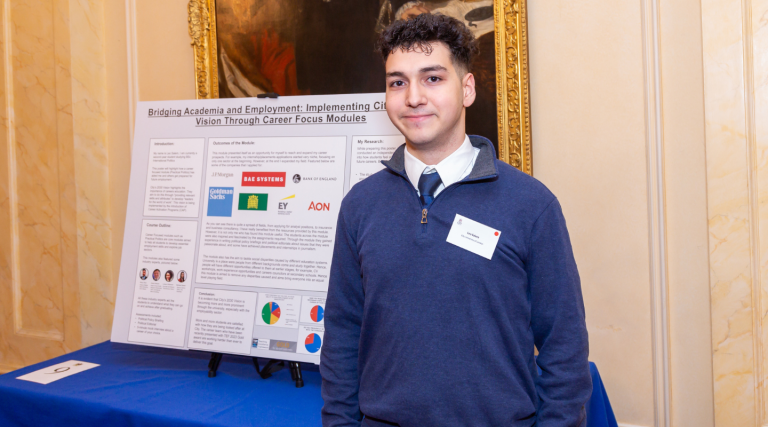The Department of Radiography recently shared its collective expertise at the largest medical imaging conference in Europe
By Mr George Wigmore (Senior Communications Officer), Published
The European Congress of Radiology (ECR) is the largest European medical imaging conference of the last 30 years. Its attendance has been increasingly growing from between 10 to 15,000 registrants annually, but recently it has surpassed 20,000 attendees.
The Department of Radiography at City, University of London has been contributing to this conference for the last few years by sharing and disseminating the research work in the areas of artificial intelligence (AI) and person-centred care (PCC) resulting from externally funded and other collaborative research projects. This year the Department recorded its largest contribution yet, with a team of seven attending the conference and presenting a total of 12 unique contributions: six oral presentations, two participations in expert panels, three posters, and one live recruiting research project (figure 1).

The team contributed to different thematic research areas, including: AI implementation in radiography, autism-friendly practices in radiological examinations, ethical AI and AI governance, MRI safety, parent -centred care in ultrasound imaging, and societal implications of AI adoption. All these projects are led by Dr Christina Malamateniou (figure 2), Reader in Radiography in the School of Health and Psychological Sciences, and current chair of research at the European Federation of Radiographer Societies and PI for the funding from the Society and College of Radiographers doctoral fellowship, CORIPS grants or other external grants. Many of the projects are collaborative and multidisciplinary in nature, involving participants from across the UK and Europe, as well as many universities, practitioners, patients and members of the public as co-researchers and industry partners.
Dr Malamateniou said: “I am so grateful for the support of our Department of Radiography and the School of Health and Psychological Sciences for getting behind us in this gigantic effort, to coordinate so many different research contributions and organise travel and accommodation in line with our funding from the College of Radiographers and the European Society of Radiology.
“I am delighted to be funded to disseminate this work, and I am indebted to the hard-working team of academic, research and clinical radiographers who produced high-quality research, suited to feature in such a high-calibre event and get one of their most prestigious awards. This is testament to the level of work we do at City, University of London and to the immense support from our HoD, Deanery and School. I sincerely hope this is one of many similar successful research dissemination events for our team and Department.”

The team also brought back one of only four of the most prestigious research awards, which was given to Gemma Walsh (figure 3) for the College of Radiographers-funded and European Federation of Radiographers-endorsed project on the “Impact of AI on European radiographer professional identity and careers”. This is the largest survey of its kind on AI in Europe, with more than 2,200 participants, and has been translated into eight languages.
The Head of Department, Chris O’Sullivan, notes: “As a Department we are proud that Gemma’s work on the impact of artificial intelligence on the careers and professional identities of radiographers has been recognised by such a prestigious award at the European Congress of Radiology. We are proud of Gemma’s research and I believe this award reflects not only Gemma’s hard work and commitment to the profession and this area of research, but also the importance of collaboration across many countries and organisations with respect to the effective implementation of AI within radiographic services.”

The members of the City Radiography Researchers Group included two academic staff members (Dr Christina Malamateniou, Ms Emily Skelton), two visiting lecturers (Mrs Barbara Nugent, Dr Ben Potts), two research assistants (Ms Gemma Walsh, Mr Nikos Stogiannos) and a master’s student (Mrs Philippa Bridgen) (figures 4). However, the wider City Radiography team and Head of Department, Mr Chris O’Sullivan, was behind this effort, to ensure time was afforded to the academics and students to deliver and present this work during what is a busy time in the academic year.
The Associate Dean of Research, Professor Steve Gillard, commented: “The radiography research group at City, University of London are leading the way in research on AI implementation in radiography, and patient-centred and autism-friendly practices in radiological examinations. It is testament to their success to see this work so well represented on the international stage.”




